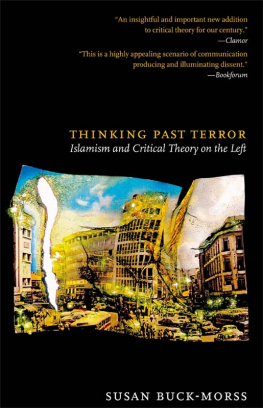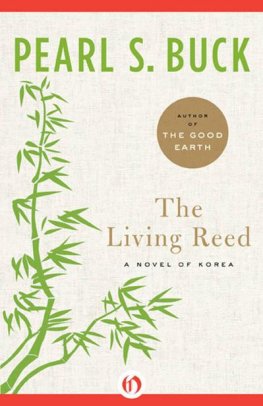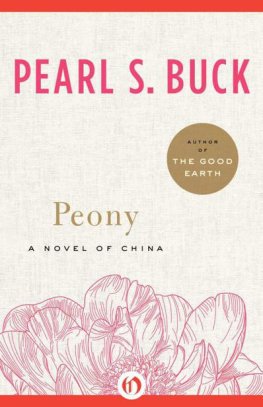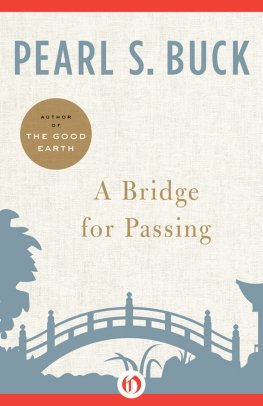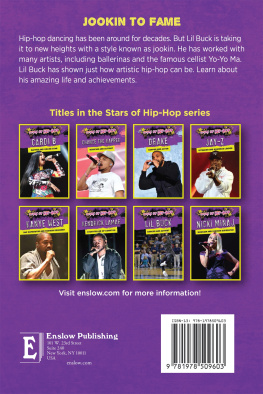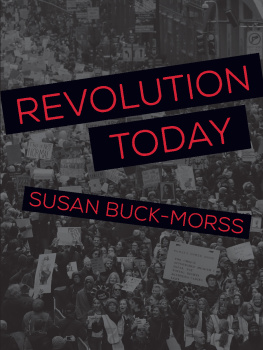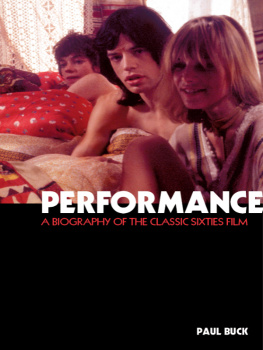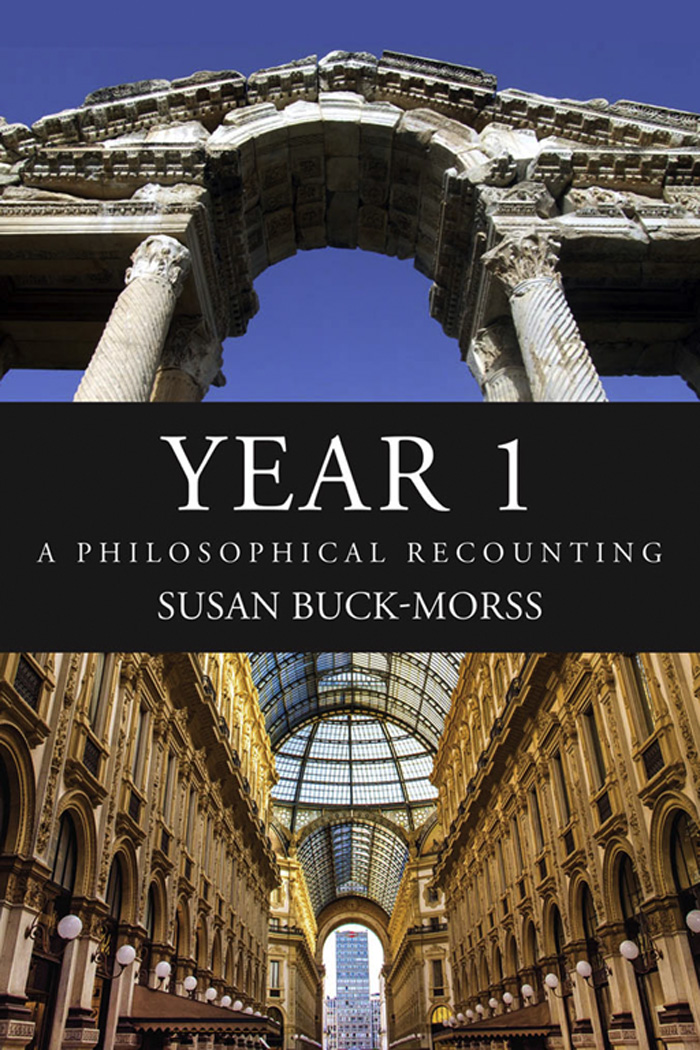
YEAR 1
YEAR 1: A Philosophical Recounting
Susan Buck-Morss
The MIT Press
Cambridge, Massachusetts
London, England
2021 Massachusetts Institute of Technology
All rights reserved. No part of this book may be reproduced in any form by any electronic or mechanical means (including photocopying, recording, or information storage and retrieval) without permission in writing from the publisher.
This book was set in Adobe Garamond Pro by New Best-set Typesetters Ltd.
Library of Congress Cataloging-in-Publication Data
Names: Buck-Morss, Susan, author.
Title: Year 1 : a philosophical recounting / Susan Buck-Morss.
Other titles: Year One
Description: Cambridge, Massachusetts : The MIT Press, [2021] | Includes bibliographical references and index.
Identifiers: LCCN 2020015015 | ISBN 9780262044875 (hardcover)
Subjects: LCSH: CivilizationPhilosophy. | Civilization, WesternRoman influences. | Chronology, Historical.
Classification: LCC CB245 .B835 | DDC 909/.09821dc23
LC record available at https://lccn.loc.gov/2020015015
10987654321
d_r0
Contents
Acknowledgments
An academic book is a collective project. Past inquiries make new interpretations possible. I am grateful to the many authors cited here, whose careful labor, condensed between covers, is a gift to those who come afterward. I honor the research libraries that conserve their work, and the online sources that provide for the social distribution of ideas, valuing accuracy and public access over profits. My deep thanks go to those colleagues who have welcomed me into their domains of expertise with hospitality and good will. At Cornell: Annetta Alexandridis, Benjamin Anderson, Jonathan Boyarin, Jill Frank, Andrew Hicks, Jeffrey Rusten. And elsewhere: Daniel Boyarin, Honora Howell Chapman, Souleymane Bachir Diagne, Erich Gruen, Bonnie Honig, Mesut Ilgum, Jonathan Price, David Runia. At the CUNY Graduate Center, I have benefited greatly from interdisciplinary discussions at the Committee on Globalization and Social Change, directed by Gary Wilder.
This book crosses the established boundaries of scholarly disciplines, and consequently confronts the existence of multiple conventions as to how ancient texts are cited, written, and referenced. Because boundary crossing is precisely the goal of the project, scholarly conventions could not be followed exclusively, and compromises needed to be established. Regarding the question of orthography for words in koine (first-century Greek), I have written in italics the direct transliteration in English of koine words (with Greek letters in parentheses) when these words, standing alone, are used in multiple contexts. In general, I have worked with the NIV Interlinear Greek-English version of the Christian Bible.
The material object that you hold in your hands calls for thanks to Ian Wallace and Milo Ward for their help in preparing the manuscript. Thanks to Senior Acquisitions Editor Marc Lowenthal at the MIT Press for his nurturing patience. The work benefited immeasurably from the extraordinary knowledge and skill of Senior Editor Matthew Abbate. My thanks to him, and to the entire team at the MIT Press.
YEAR 1 is dedicated to my partner of 36 years, and even more to his grandparents born in Sicily, my maternal grandmother born in Austria and grandfather born in Greece. The diaspora has been kind to us. May it be so for others.
Introduction
YEAR 1 is a project in the reconfiguration of knowledge. The focus is on the first century. All of the schemata of modernitytime, space, conceptual differentiations, and categories of collective belongingare put to the test of comprehending this alleged beginning, and none survives unscathed. The epistemological apparatus that modernity calls history was supposed to hold the past in place in an order leading to the present in coherent narrative form. But history writing itself provides knowledge that overturns this ordering presumption, freeing the past to speak otherwise.
Beneath the headlines of digital learning and data banks, a quiet revolution has been under way. Scholarship is transforming the very structures of knowledge, those conceptual frames that divide and order the record of human experience. In regard to the first centurythis is why focusing on this moment in time is so revealingthe three most fundamental categories of historical narrativesHellenism, Christianity, Judaismdistort the evidence. Conceptual distinctions between religion and politics, science and aesthetics, Athens and Jerusalem, or East and West do not make sense of the first-century world. The conventional approach of allotting historical material to the separate disciplines of classics, theology, and the modern secular humanities is seriously misleading. The search for origins of distinct groups leads, not to a purified source, but rather to the disappearance of the separations themselves.
Our main sources are three first-century authors who are seldom grouped together, indeed seldom even included in the usual stories told: Flavius Josephus, historian of the Judaean War; the neo-Platonic philosopher Philo of Alexandria; and John of Patmos, author of Revelation (Apocalypsis), the last book of the Christian Bible. Readers may not be familiar with any of them, and those who know one may be ignorant of the others. Yet taken seriously on their own terms, they lead in surprising directions that contradict profoundly what we think we know, providing keys to a radical overturning of the epistemological preconceptions of our time. When this occurs, an abundance of interconnections becomes possible as temporally dispersed characters are drawn into the vortex of historical rearrangement. Antigone and John Coltrane, Plato and Bulwer-Lytton, Nicholas of Cusa and Zora Neal Hurston, al-Farabi and Jean Anouilh all make an appearance, not to mention Descartes, Kant, Hegel, Kristeva, and Derrida.
Owning Time
It is possible to colonize time as well as territory. It happens when particular collectives claim a specific, vertical slice of history, set upon it a flag of national or religious belonging, and control the production and distribution of the meanings that are mined within it. This clearly has been the fate of the first century. Contemporary anthropology has led the way in exposing the violent distortions in knowledge that colonization of space entails. This critique applies as well to colonized time. In exploring the distant past, we are foreigners entering alien territory. The natives share understandings not accessible to us without translation. Even if, linguistically, we know their words, we cannot assume proprietary rights over the meanings they convey. Even if we can trace the erratic path by which they have been rescued throughout time and come down to us, the privatizing laws of inheritance do not apply.
The conceptual landscape that we call globalization is forcing the transformation of historical understanding. Pollution, climate change, and viruses spread promiscuously, but so do ideas. People escape all the time from assigned containers. Humanity really is one. An educated public cannot afford to have its knowledge bound at the edge of a nation, or culture, or religion, or civilization. We are encouraged to see the noisy clashes of tribalism that dominate our media as rearguard sniping from defeated forces. It is increasingly difficult to deny what experience, on all sides, teaches: the borders between us are too porous to be defended without violating the very values for which we fight. The binary logics of us-versus-them no longer make sense of our world. Geopolitical hierarchies of difference cannot be defended.
Next page

